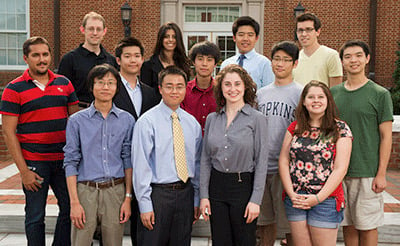Teams Johns Hopkins – Software, and Johns Hopkins – Wetware secured a win at the International Genetically Engineered Machine (iGEM) 2012 competition. Organized annually by MIT, the iGEM competition is a worldwide Synthetic Biology competition specifically targeted to undergraduate students. The goal of the competition is to build simple biological systems from standard, interchangeable parts and operate them in living cells. Using a library of standardized parts (BioBrick), student teams were asked to design and build genetic machines. This year the BME undergraduates were competing against almost 200 teams.
Team Johns Hopkins-Software secured the World Championship Software Prize for its development of a new software program named AutoGene. AutoGene is a cloud based Computer Aided Design (CAD) tool that streamlines the information visualization, design process and fabrication workflow of synthetic DNAs. Johns Hopkins-Software team members include Xiaotian ‘Album’ Shen (BME, 2014), George Chen (BME, 2015), Emily Scher (CS, 2015) and Robert Eisinger (CS, 2013).
The Johns Hopkins-Wetware team won a Regional Gold Medal for its development of tools for yeast synthetic biology in both the academic and industrial settings. The optogenetic cell cycle control system in S. cerevisiae (budding yeast) will replace outside chemicals that are current standard for inducing cell arrest. Wetware members include James Chuang (BME 2014), Margo Heston (BME 2015), Jerry Wang (BME 2015), Jake Kim (MCB 2013), Anne Marie Noronha (MCB 2013) and Scott Tan (MCB 2013).
“We’re really proud of both teams,” says Jef Boeke, Ph.D., professor of molecular biology and genetics at the Johns Hopkins Institute for Basic Biomedical Science and a mentor for the teams. “The competition this year was really stiff, almost 200 teams, but they held their own.”
Dr. Giovanni Stracquadanio, a postdoc fellow at the department of Biomedical Engineering at JHU and supervisor of the JHU iGEM teams, stated “As a postdoc, I jumped at the chance to help with iGEM. The process is really like running a small lab. It’s a great opportunity to mentor students and manage a project. The teaching experience will be valuable for my future career.”
Additional iGEM team members include mentors Joel Bader, Ph.D. (BME), Yizhi Cai, Ph.D. (HiT Center, School of Medicine), Leslie Mitchell, Ph.D. (HiT Center, School of Medicine), Debra JH Mathews (Berman Institute of Bioethics), Marc Ostermeier (ChemBE) and Karen Zeller (MBG) as well as student mentors Steffi Liu (BME), Andy Tu (BME) and Daniel André Wolozny Gómez (ChemBE).
The JHU teams have been generously supported by the Johns Hopkins University Department of Biomedical Engineering, High Throughput Biology Center, Student Initiative Fund, Provost Undergraduate Research Award, Department of Chemical and Biomolecular Engineering, Department of Computer Science, Woodrow Wilson Undergraduate Research Fellowship, as well as corporate sponsors Autodesk, Integrated DNA Technologies and Genscript.

